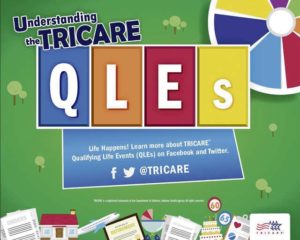by TRICARE Communications

Every year during TRICARE Open Season, you can enroll in or change your TRICARE Prime or TRICARE Select health plan. But did you know that outside of TRICARE Open Season, you can only enroll in or make changes to your TRICARE Prime (including the U.S. Family Health Plan) or TRICARE Select plan following a Qualifying Life Event (QLE)? A QLE is a certain change in your life, such as marriage, birth of a child, change of address, or retirement from active duty. Different TRICARE health plan options may be available to you and your family members after a QLE.
Options Following a QLE
Following a QLE, you and your family members have three options depending on your situation:
- If you wish to continue your current coverage following a QLE and remain eligible for your current health plan, you don’t need to take action. Your coverage will continue uninterrupted.
- If you want to make a change to your health plan enrollment, you have 90 days following the QLE to make any eligible changes.
- If you’re eligible for TRICARE but not enrolled in a TRICARE plan, you have 90 days following the QLE to enroll in a health plan. If you or your family members aren’t enrolled in a health plan and don’t enroll in one within 90 days of a QLE, you’ll only be eligible for care at a military hospital or clinic if space is available.
Remember, a QLE for one family member creates a QLE for all family members.
Examples of QLEs
What counts as a QLE? There are different types of TRICARE QLEs, including military changes, family changes, and government-directed changes. Many of them revolve around changes in job, location, or family status. Some common examples of TRICARE QLEs include:
- Change in sponsor status that results in ineligibility to continue existing coverage. This includes retiring from active duty, separating from active duty, activating, or deactivating.
- Change in family composition. This includes getting married or divorced, giving birth, adopting a child, placement of a child by a court in a member’s home, and more.
- Moving. This includes moving to a new state, a new Zip code (plus four), a child moving away to college, and more.
- Losing sponsor or family member eligibility. This includes when a Retired Reserve member turns 60 or when the sponsor or any dependent turns age 65, and become eligible for Medicare.
To see the full list of QLEs and examples, go to the Qualifying Life Events section on the TRICARE website.
What to Do Following a QLE
With any QLE, the first step is to update your or your family member’s information in the Defense Enrollment Eligibility Reporting System (DEERS). You must update DEERS before you contact TRICARE to make the change. Depending on your QLE, you may need to provide official documents, like a birth or marriage certificate, to update DEERS. Find your nearest ID card office and call ahead to make an appointment or to verify which documents you need to bring.
Once your change shows in DEERS, you can then enroll or change your TRICARE coverage. You may make eligible health plan enrollment changes online, by mail, or by phone. Enrollment must be within 90 calendar days of the date of the QLE. Coverage starts on the QLE date. Enrollment fees, if required, begin on the QLE date, not the date the enrollment request is submitted. Once you enroll, your TRICARE regional contractor can confirm your enrollment.
Making Enrollment Changes When You Don’t Have a QLE
If you and your family don’t experience a QLE, you can only enroll in or make changes to your TRICARE Prime or TRICARE Select health plan during the annual TRICARE Open Season. QLE and open season enrollment rules apply only to TRICARE Prime and TRICARE Select. Premium-based plans (TRICARE Reserve Select, TRICARE Retired Reserve, TRICARE Young Adult, and the Continued Health Care Benefit Program) offer continuous open enrollment throughout the year. However, keep in mind that certain QLEs may mean you or your family members may become eligible for TRICARE Prime or TRICARE Select (for example, when a Selected Reserve member is called to active duty for more than 30 days).
Life changes are inevitable. When they occur, your TRICARE health options may change too. Knowing how to navigate QLEs with TRICARE can help you take command of your health and the health of your family this year. For more information about QLEs and the impact they may have on you or your family, visit Qualifying Life Events.



